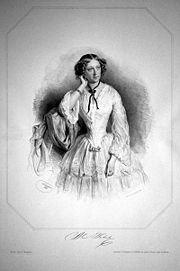
Marie Seebach
Encyclopedia

She was born in Riga
Riga
Riga is the capital and largest city of Latvia. With 702,891 inhabitants Riga is the largest city of the Baltic states, one of the largest cities in Northern Europe and home to more than one third of Latvia's population. The city is an important seaport and a major industrial, commercial,...
, Livonia, Russian Empire
Russian Empire
The Russian Empire was a state that existed from 1721 until the Russian Revolution of 1917. It was the successor to the Tsardom of Russia and the predecessor of the Soviet Union...
as the daughter of an actor, Wilhelm Friedrich Seebach (1798–1863). After appearing first at Nuremberg
Nuremberg
Nuremberg[p] is a city in the German state of Bavaria, in the administrative region of Middle Franconia. Situated on the Pegnitz river and the Rhine–Main–Danube Canal, it is located about north of Munich and is Franconia's largest city. The population is 505,664...
as Julie in Kean, she played soubrette parts at Lübeck
Lübeck
The Hanseatic City of Lübeck is the second-largest city in Schleswig-Holstein, in northern Germany, and one of the major ports of Germany. It was for several centuries the "capital" of the Hanseatic League and, because of its Brick Gothic architectural heritage, is listed by UNESCO as a World...
, Danzig
Gdansk
Gdańsk is a Polish city on the Baltic coast, at the centre of the country's fourth-largest metropolitan area.The city lies on the southern edge of Gdańsk Bay , in a conurbation with the city of Gdynia, spa town of Sopot, and suburban communities, which together form a metropolitan area called the...
and Cassel
Kassel
Kassel is a town located on the Fulda River in northern Hesse, Germany. It is the administrative seat of the Kassel Regierungsbezirk and the Kreis of the same name and has approximately 195,000 inhabitants.- History :...
. In 1852 she achieved her first great success at the Thaliatheater in Hamburg
Hamburg
-History:The first historic name for the city was, according to Claudius Ptolemy's reports, Treva.But the city takes its modern name, Hamburg, from the first permanent building on the site, a castle whose construction was ordered by the Emperor Charlemagne in AD 808...
as Gretchen in Goethe's Faust
Goethe's Faust
Johann Wolfgang von Goethe's Faust is a tragic play in two parts: and . Although written as a closet drama, it is the play with the largest audience numbers on German-language stages...
, and she remained there until 1854, when she appeared in Vienna
Vienna
Vienna is the capital and largest city of the Republic of Austria and one of the nine states of Austria. Vienna is Austria's primary city, with a population of about 1.723 million , and is by far the largest city in Austria, as well as its cultural, economic, and political centre...
.
She then played in Munich
Munich
Munich The city's motto is "" . Before 2006, it was "Weltstadt mit Herz" . Its native name, , is derived from the Old High German Munichen, meaning "by the monks' place". The city's name derives from the monks of the Benedictine order who founded the city; hence the monk depicted on the city's coat...
, establishing her reputation as a tragic actress with the lead roles in Jane Eyre and Adriana Lecouvreur
Adriana Lecouvreur
Adriana Lecouvreur is an opera in four acts by Francesco Cilea to an Italian libretto by Arturo Colautti, based on the play by Eugène Scribe and Ernest Legouvé...
. From 1855 to 1866 she was engaged at the court theatre at Hanover
Hanover
Hanover or Hannover, on the river Leine, is the capital of the federal state of Lower Saxony , Germany and was once by personal union the family seat of the Hanoverian Kings of Great Britain, under their title as the dukes of Brunswick-Lüneburg...
, and there in 1859 she married the tenor Albert Niemann
Albert Niemann (tenor)
Albert Wilhelm Karl Niemann was a leading German tenor opera singer especially associated with the operas of Richard Wagner...
. In 1866 she followed her husband to Berlin, but separated from him after two years. In 1870-1871 she visited the United States, and gave in seventeen cities no less than io performances mostly of Faust; and in 1886 she accepted a permanent engagement at the Schauspielhaus
Schauspielhaus
Schauspielhaus is the German word for Theatre.The following theaters are referred to as Schauspielhaus:- Berlin :* Schauspielhaus Berlin, now Konzerthaus Berlin* Großes Schauspielhaus* Neues Schauspielhaus...
in Berlin. She retired from the stage in 1897, and died on the 3rd of August of that year. In 1895 she endowed a home for poor actors and actresses at Weimar
Weimar
Weimar is a city in Germany famous for its cultural heritage. It is located in the federal state of Thuringia , north of the Thüringer Wald, east of Erfurt, and southwest of Halle and Leipzig. Its current population is approximately 65,000. The oldest record of the city dates from the year 899...
, called the Marie Seebach Stiftung.
See Gensichen, Aus Marie Seebachs Leben (Berlin, 1900).

